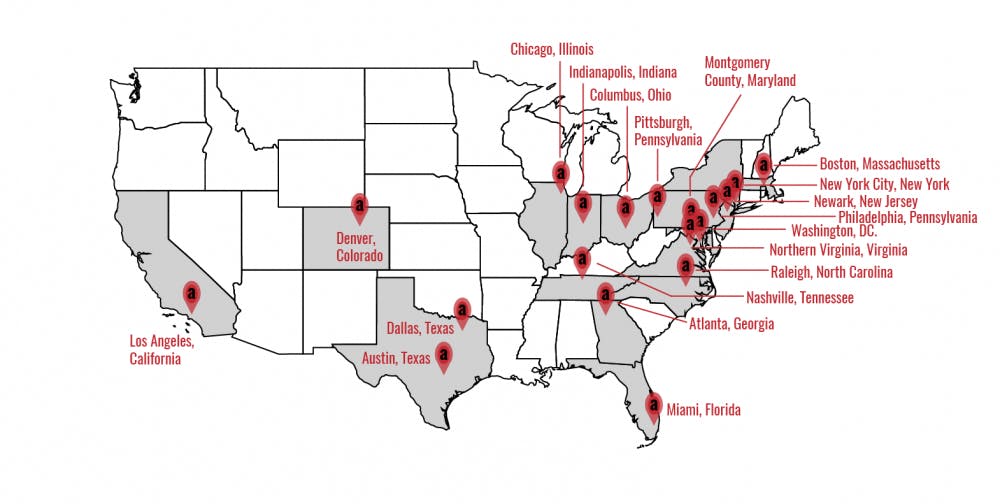Amazon included Raleigh on its list of the 20 finalists for the location of the company’s second headquarters. Some of the other contenders being considered include New York City, Washington, D.C. and Boston.
There were 238 locations across the United States, Canada and Mexico that pitched to Amazon. The list was narrowed down to 20 different cities in January, with Raleigh remaining.
If Amazon were to come to Raleigh, the company would bring a $5 billion investment, 50,000 new jobs and many additions to the infrastructure in the Triangle, according to the Charlotte Observer. Its new location would also be about an hour drive from Elon University’s campus.
But some local residents of the Triangle believe Amazon coming to the area would bring more drawbacks than it would benefits for the state.
“I-40 already has a ton of traffic, and I know Amazon would help the economy but it would turn everything into a cluster,” said sophomore Matt Bradley, who frequently drives Interstate 40.
“The two primary challenges would be a spike in real estate values and congestion in the area,” said Brandon Sheridan, assistant professor of economics. “The 50,000 employees would be phased in over 10 to 15 years. So, in the long term, locals would definitely see changes in the prices of their homes.”
According to a report by Market Watch, Raleigh’s average annual rent growth is the highest in the country over the last decade — 3.2 percent. The report says the additional annual rent growth from the second Amazon headquarters would be between 1.5 to 2 percent — more than any other city in the United States. Over the next 10 years, the annual rent growth could cost current homeowners more than $15,356.
The possible rise in real estate numbers could cause problems for future Elon faculty. Potential new hires might attempt to negotiate more lucrative salaries with the university to compensate for the increased price of their homes.
Congestion would be a significant problem for the town of Elon. With 50,000 high-paying jobs entering the Triangle over the next decade, population would increase, and as a result, more traffic and strain on the infrastructure would be causes for concern.
Possible solutions to these infrastructure issues would likely result in increasing the amount of money spent on maintenance.
If Amazon were to choose Raleigh as the location for its second headquarters, it would be beneficial to Elon University students. Sheridan said Elon would be able to connect students to better job opportunities because of the influx of businesses that would follow Amazon to the Triangle.
“Something we do at Elon now, is we partner with businesses within the state. We send students to their sites and they come to campus to recruit,” Sheridan said.
The presence of several other universities in the Triangle could pose a challenge to Elon, as its potential could be overlooked.
But Sheridan believes Elon will still be able to partner with Amazon in business. He said that for a small institution, Elon consistently produces high-quality students that would be beneficial to any company as an intern or full-time employee.
Engineering, accounting, computer science and communications are all valuable fields of study offered at Elon. Sheridan thinks these programs could benefit Amazon.
Speculations of potentially landing the second headquarters in Raleigh will be discussed through a Community Business Forum held by the North Carolina Business Council from 5-7 p.m. on March 14 in the LaRose Digital Theatre.
“The point of this is to educate people more about what this type of growth means and looks like,” said Vicki Parker, executive director of the North Carolina Business Council.
Sheridan is the moderator of the event, and notable economists Michael H. Shuman and Brent Lane will be speaking. David Shaner, founder and CEO of Offline Media, will also be speaking on Amazon’s effect on technology companies.
The goal of the panel is to promote dialogue between local residents and business leaders so they can be a part of the possible economic growth. The forum will give the Elon community and Alamance County residents an opportunity to share their input with two economists and an established business owner.
“We want our business leaders and legislators to know that we want to be engaged in our economic development,” Parker said.


